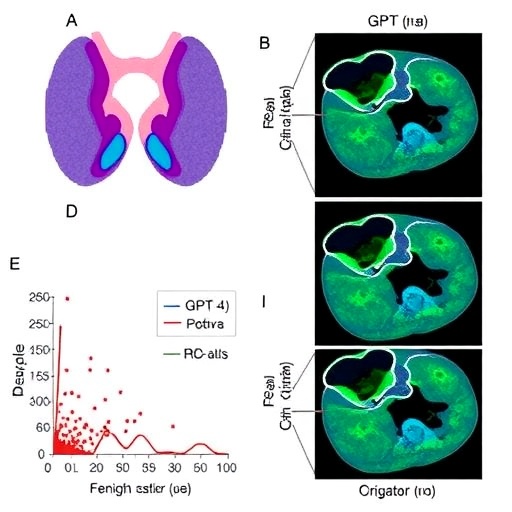In a groundbreaking study slated for publication in the esteemed journal Military Medicine Research, researchers have unveiled the noteworthy potential of GPT-4—a sophisticated artificial intelligence model—in revolutionizing prostate biopsy decision-making. The impetus behind this exploration was rooted in the challenges facing clinicians with traditional biopsy methods, particularly in interpreting multi-parametric Magnetic Resonance Imaging (mpMRI) results. As medical professionals tirelessly seek improvements in diagnostic accuracy, this multi-center evidence study provides compelling insights into how AI can augment clinical workflows and enhance patient outcomes.
The study, carried out by a team of prominent researchers, including Shi, Wang, and their collaborators, meticulously assessed the performance of GPT-4 in synthesizing imaging data and clinical information to inform biopsy recommendations. By analyzing a cohort of patients with suspected prostate cancer, the study aimed to determine the AI’s efficacy in discerning clinically significant lesions from the vast sea of imaging data derived from mpMRI scans. The necessity for a reliable diagnostic tool is paramount, given that prostate cancer remains one of the leading causes of cancer-related mortality among men globally.
In a clinical landscape where time is of the essence, the integration of AI technologies like GPT-4 could significantly streamline the decision-making process for healthcare providers. The researchers outlined how conventional biopsy procedures often entail a rigorous review of mpMRI images, a task that can be prone to human error and inconsistencies. By automating portions of this process, GPT-4 had the potential to not only enhance diagnostic accuracy but also reduce the time that clinicians spend on interpretation, ultimately allowing them to focus more on patient care.
The study’s design was methodical, employing a robust multi-center approach that drew upon data from a diverse range of medical institutions. This breadth of input ensured a comprehensive analysis, incorporating varying degrees of patient demographics and healthcare settings. By leveraging such a wide array of data, the team aimed to evaluate GPT-4’s performance under different clinical conditions, thus ensuring the results would be actionable across multiple healthcare environments—a crucial factor for the future applicability of AI in medicine.
As the researchers delved deeper into their findings, they presented data that illuminated GPT-4’s capabilities in accurately predicting which patients would benefit most from biopsy intervention. The AI’s ability to process complex information rapidly not only highlighted potentially malignant lesions but also assisted in stratifying patients based on their likelihood of harboring aggressive disease. Such stratification is essential in ensuring that only those at heightened risk undergo invasive procedures, thereby minimizing unnecessary interventions and optimizing resource allocation within healthcare systems.
Moreover, one of the standout features of GPT-4, as revealed in the study, was its ability to learn from ongoing data input and refine its algorithms accordingly. This adaptability is a significant leap forward from more static models, allowing GPT-4 to evolve and improve its predictions over time as it processes new information. This raises the prospect of continuous improvement in diagnostic methods, wherein the AI becomes increasingly adept at discerning subtle nuances within mpMRI data that may elude human interpretation.
Throughout the study, rigorous statistical analyses were employed to quantify GPT-4’s performance metrics compared to traditional diagnostic methods. This included evaluating sensitivity, specificity, and positive predictive values, providing a clear picture of how the AI model stacks up against human experts in terms of diagnostic capability. Preliminary results demonstrated that GPT-4 achieved notable performance levels, offering a promising glimpse into a future where AI can be seamlessly integrated into regular clinical practice.
The implications of such advancements extend beyond mere efficiency. Enhanced decision-making aids foster a more confident approach to patient management, ultimately leading to improved outcomes. Furthermore, as more medical institutions embrace digital transformation, the role of AI in health care is poised to expand dramatically, potentially revolutionizing how diseases like prostate cancer are diagnosed and treated.
As the study gathers momentum in the peer-review process, the excitement within the medical community is palpable. Many experts are keenly observing the trajectory of AI applications in diagnostic medicine, particularly familiarizing themselves with the capabilities of GPT-4 in diverse therapeutic contexts. The advancements stemming from this research could set a precedent for further investigations into the use of AI in other areas of oncology, tapping into its potential to transform cancer care on a broader scale.
In the face of challenges presented by traditional methodologies, the convergence of AI and medical expertise represents a daunting yet thrilling frontier. As researchers continue to unveil the full potential of models like GPT-4, they pave the way for a new era—one in which technology and medicine intertwine more seamlessly than ever before. The study by Shi and colleagues marks a significant milestone, sparking discussions around best practices, ethical considerations, and the future of AI integration into clinical workflows.
The ongoing exploration of AI in healthcare embodies not just a technological evolution but a paradigm shift in how medical decisions are approached and made. With each new study, like that of Shi and Wang, we inch closer to a reality where patient care is increasingly data-driven and personalized. As the findings from this multi-center investigation circulate, they hold the promise of catalyzing further research, thereby powering innovations that could ultimately save lives.
As excitement builds around GPT-4, researchers, clinicians, and patients alike stand on the precipice of a transformative leap in how prostate cancer and other medical conditions are diagnosed and managed. For the medical community and for patients across the globe, these developments signal hope—a future where advanced AI tools can usher in unprecedented levels of precision in healthcare.
Subject of Research: Performance of GPT-4 for automated prostate biopsy decision-making based on mpMRI.
Article Title: Performance of GPT-4 for automated prostate biopsy decision-making based on mpMRI: a multi-center evidence study.
Article References: Shi, MJ., Wang, ZX., Wang, SK. et al. Performance of GPT-4 for automated prostate biopsy decision-making based on mpMRI: a multi-center evidence study. Military Med Res 12, 33 (2025). https://doi.org/10.1186/s40779-025-00621-3
Image Credits: AI Generated
DOI: 10.1186/s40779-025-00621-3
Keywords: GPT-4, prostate biopsy, mpMRI, artificial intelligence, automated decision-making, healthcare innovation.




